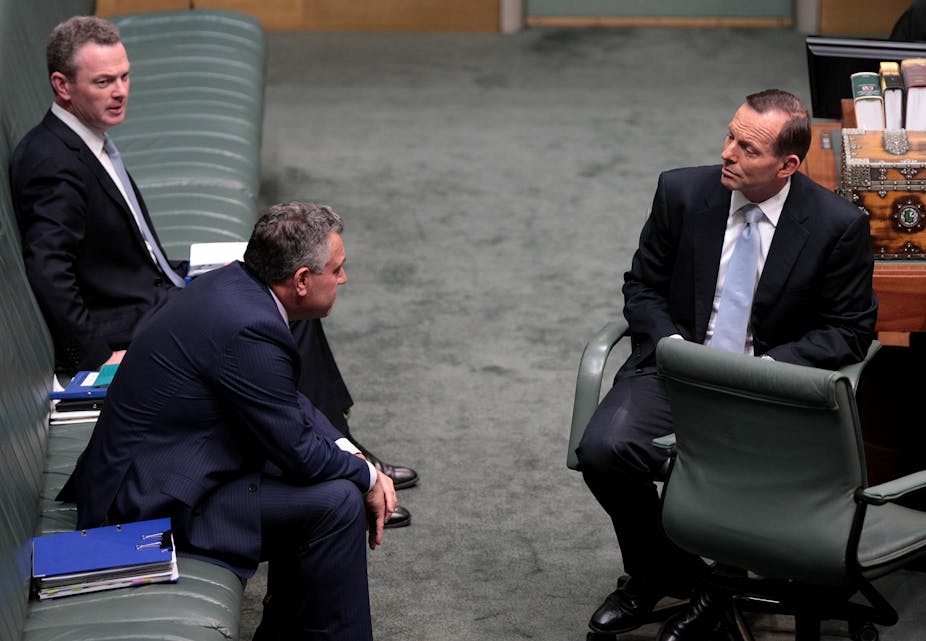The defeat of the Abbott government’s higher education reform package in the Senate on Tuesday night adds another line to its long list of policy failures. This defeat both reflects particular political circumstances and the general landscape of higher education policy in Australia.
The Abbott government has been reluctant to understand the objections that the Senate has posed to its agenda. Central here, as Guy Rundle has argued, has been a misreading of the Palmer United Party, and the Senate crossbenchers.
The government assumed it would receive support from the crossbenchers. Although it eventually made concessions these were too little too late, and largely served to increase crossbench suspicion. Education Minister Christopher Pyne’s attempt to directly link short-term research funding to the passage of the reform package was unhelpful.
The government misread the crossbench – but most of all, it failed to win popular support. The crossbenchers believed they were the voice of public opinion, and Labor – usually highly sensitive to any hint of public opposition to Coalition policies (as we have seen on national security) – was happy to play the populist card of “$100,000 degrees”.
Why is higher education unfavourable ground for the government?
Pyne made the apparently egalitarian argument that current levels of subsidy for university courses benefited a minority of high-income earners and were at the expense of taxes paid by those who didn’t go to university.
This appeal was notably unsuccessful with non-university graduates such as senators Jacqui Lambie, Ricky Muir and Glenn Lazarus, who represented a working-class constituency that populist conservatives once admired from a safe distance.
After the unpopular 2014 budget, the government lacked credibility to make an equity argument. Nevertheless, behind Pyne’s populist provocation, there was a more considered argument. The government’s case echoed the arguments of public choice analysts that, in a democracy, small and organised pressure groups are able to lean on governments to favour them at the expense of the politically disengaged majority.
The government sought to cast university graduates as a privileged minority opposed to the general public. However, in the case of the Abbott government’s education reforms, it was organised pressure groups such as university vice-chancellors that were most in favour of government policy. Voters did not accept the government’s attempted egalitarian argument.
To a majority of voters, access to university now seems a crucial road to economic advancement. A cabinet of graduates from elite universities failed to see that most students are not enrolled at elite universities. Even if only a minority of voters end up attending university, they and their parents still value the option of university attendance.
Perhaps voters overestimate the plausibility of themselves or their children attending university. Or perhaps they prefer to gamble on the chance of a higher income from university study, even if on average they are slightly disadvantaged by the taxes required to subside fees.
Whatever the case, public support for government regulation posed a challenge for the government. It is for this reason that the government and conservative commentators sought to persuade Labor of the validity of its reform program.
Past Labor notables such as John Dawkins and Peter Beattie were recruited to argue the case for aspects of the reforms – but with little success.
Could the government win Labor support for a revised policy?
The 2014 budget was contemptuous of egalitarian goals. Voters responded with hostility. Some conservative commentary has hinted that the government should strive for a grand bargain with Labor on budgetary policy that would revive the alleged 1980s bipartisanship on economic reform.
Such an agreement would require concessions on equality that the current government would be unclear on how to deliver and that modern Labor might not accept.
The political left can claim victory in the defeat of the Abbott government’s higher education package. However, the left is itself divided in two. There are those who defend the 1980s Dawkins agenda of increased participation in higher education as a means to increased productivity and income. Then there are those who think education is a good in itself.
It is the latter vision that has impelled in-principle resistance to university fees as a form of commodification. But this is also a vision at times uneasy about the mass higher education system that Labor governments have fashioned.
In public universities, many humanities academics bewail Abbott’s inequitable polices but in private fret about educational standards and the utilitarian attitude of many students.
Most advocates of the liberal-humanist ideal of education decamped to the Greens long ago. As a result, Labor is largely united on higher educational policy. It is rather economic change that challenges Labor’s loyalty to the Dawkins model.
As Labor MP and former professor of economics at the Australian National University Andrew Leigh has suggested, economic inequality may have grown to levels beyond that which improved educational opportunity can address, while students’ ability to succeed in tertiary study still largely reflects their social and cultural background.
If Labor and the Greens are to make a real mark on higher education, they must respond to these challenges.

